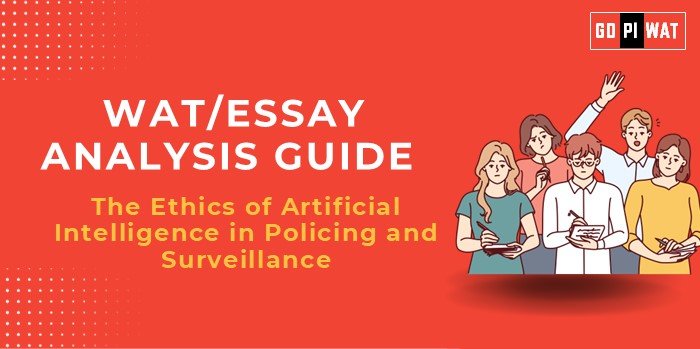📋 WAT/Essay Analysis Guide: The Ethics of Artificial Intelligence in Policing and Surveillance
🌐 Understanding the Importance
The ethics of AI in policing intersects with themes like governance, technology, and human rights, making it highly relevant for B-school essays on leadership and decision-making.
📝 Effective Planning and Writing
- ⏳ Time Allocation:
- Plan: 5 minutes
- Write: 20 minutes
- Review: 5 minutes
- 📚 Preparation Tips:
- Gather recent examples.
- Focus on stakeholder impact.
- Balance arguments effectively.
💡 Introduction Techniques for Essays
- 🔄 Contrast Approach: “While AI predicts crimes with remarkable precision, its biases challenge its ethical acceptability.”
- 💡 Solution-Based Approach: “AI in policing requires ethical frameworks to balance innovation and privacy.”
📖 Structuring the Essay Body
🏆 Achievements:
- ⚡ Highlight efficiency and success stories like missing persons found via AI.
⚠️ Challenges with Comparative Analysis:
- 🌍 Discuss global misuse, such as China’s lack of safeguards versus EU regulations.
🔮 Future Outlook:
- 🌐 Advocate for ethical AI adoption frameworks.
✅ Concluding Effectively
- ⚖️ Balanced Perspective: “AI’s promise in law enforcement is undeniable, but ethical concerns must be addressed for its sustainable success.”
- 🌍 Global Comparison: “Adopting EU-style regulations can ensure responsible AI use in policing worldwide.”
🔧 Recommendations for Sustainable Progress
- 🌐 Develop international ethical standards for AI.
- 📢 Promote public transparency in AI surveillance.
- 🤖 Foster AI fairness through diverse datasets.
✍️ Sample Short Essays
- ⚖️ Balanced Perspective: “AI in policing bridges efficiency gaps but risks deepening biases. Ethical safeguards can unlock its full potential.”
- 💡 Solution-Oriented: “Implementing global AI guidelines ensures innovation without infringing on civil liberties.”
- 🌍 Global Comparison: “The EU’s AI ethics approach sets a global benchmark for sustainable and fair policing practices.”


